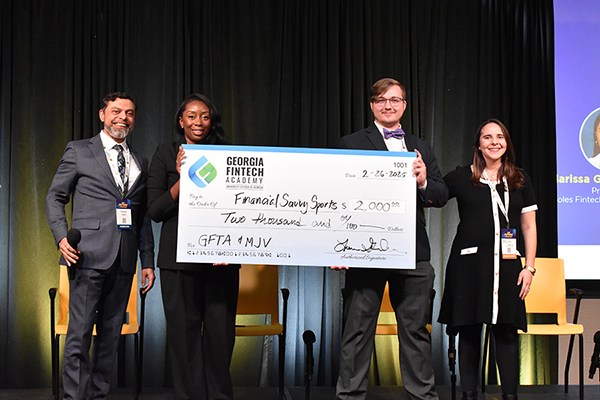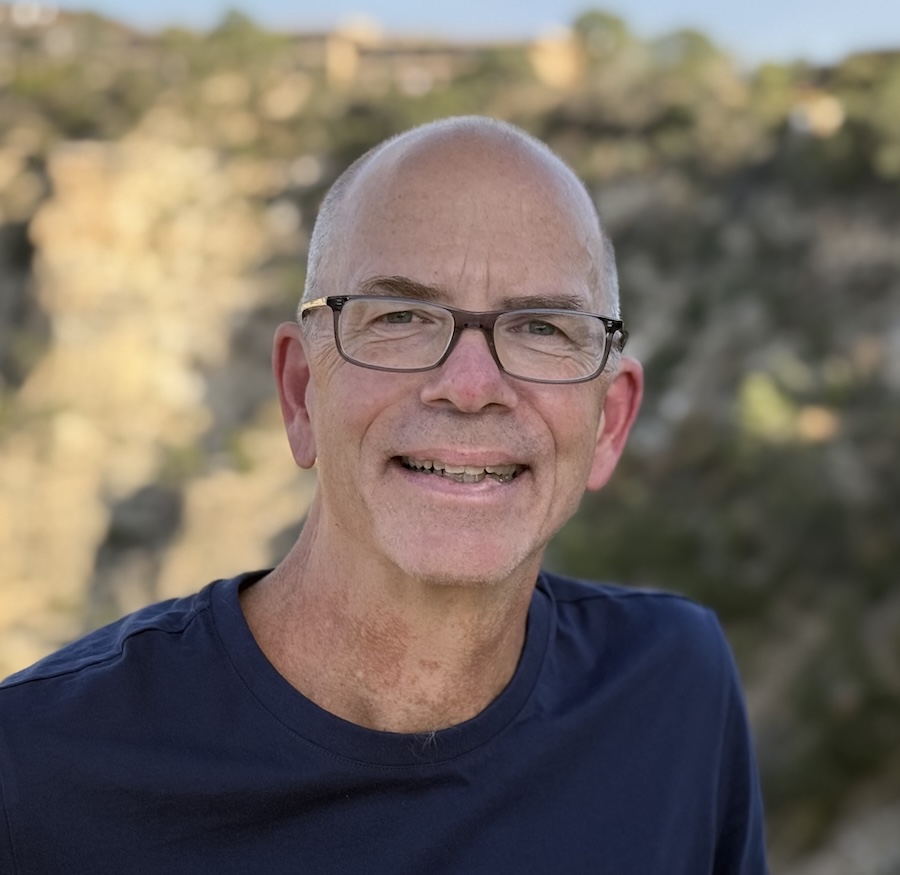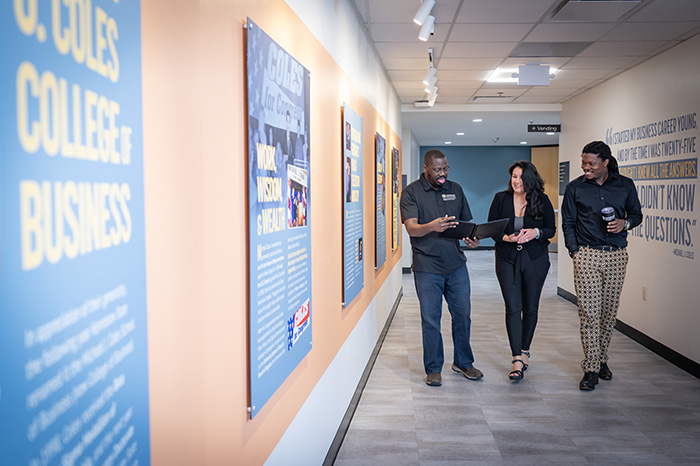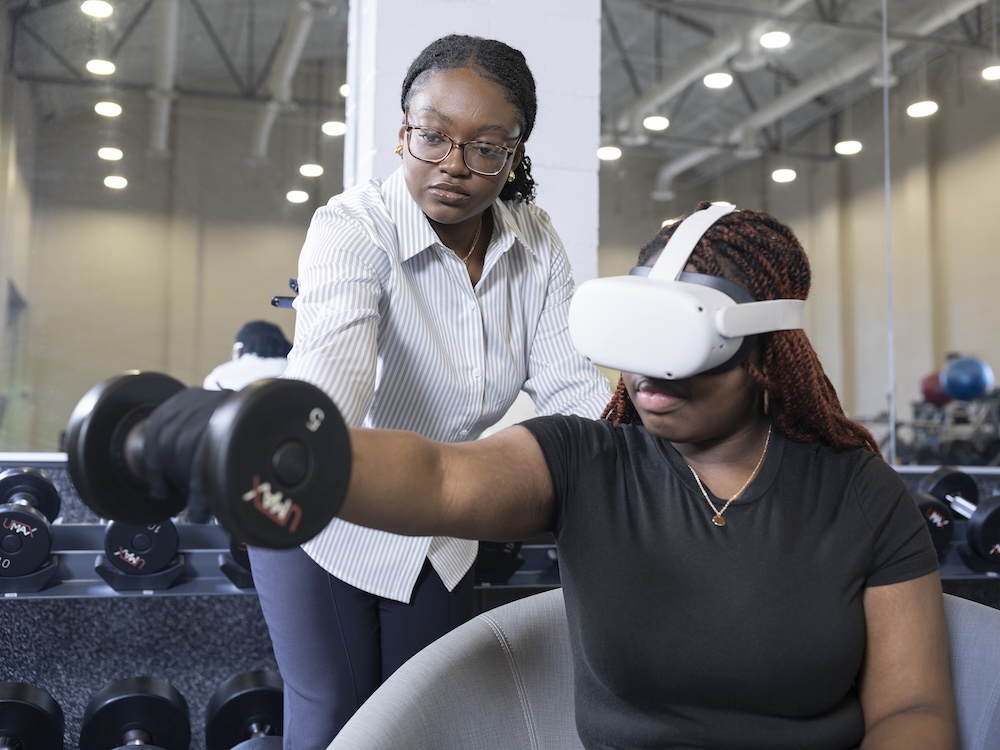
Coles College Students Aid Small Businesses Hit by Pandemic
KENNESAW, Ga. | May 14, 2020
Birton Cowden’s undergraduate entrepreneurship and MBA students are putting their classroom knowledge to work to help businesses struggling to survive through the Covid-19 pandemic.
“I put a challenge out to all of my current and past students to take action to help their local small businesses,” Cowden said. “I told them I would give them a large sum of extra credit to come up with alternative business models or even new ones for local businesses to give value to their customers.”

Cowden is assistant professor of management and research director at Coles’ Robin and Doug Shore Entrepreneurship Center in the Michael A. Leven School of Management, Entrepreneurship and Hospitality. He said the idea came easily to him, because the class he teaches for undergraduate capstone students is about how to thrive during uncertainty.
“In most of my entrepreneurship courses, I teach the process of how to navigate and be dynamic in the face of uncertainty,” said Cowden. “During such times, I remind my students that they have the tools to not only navigate these times for themselves, but also to help others.”
In a short video he posted to LinkedIn and Facebook, Cowden explained how he wanted them “to help local businesses adapt their business models to survive during these times.”
“If we look at the business model, the distribution channels, the customer relationships, the key partners and their revenue model, and then if we can adopt those for our small business owners to still deliver the value and resources that they can control, I think we can have a positive impact on our local economy and keep these businesses going,” he said.
Helping small business survive
Cowden said he wants his students to explore ways to help businesses among those hit hardest during the Coronavirus outbreak, like those that have had to shut down some or all of their operations.
“If you can’t physically conduct business, then how can you help that business owner capitalize on the virtual element, for example.” said Cowden.
One of Cowden’s students is helping yarn stores and manufacturers attract more customers through social media outreach, while another is helping a local printing business enable its employees to work remotely.
“I have been working with a small copier business these past weeks to transition their current business model to something that will work during these uncertain times,” said sophomore Kaleigh Davidson of Hoschton, who is majoring in management.
“The goal was to transfer their existing data to an online platform so their workers could work from home,” she said. “The broad set of data included current customers’ finances and what they owe alongside the firm’s operating costs.”
Davidson said the transition to the online platform was successful, and employees have been able to work remotely.
“The owner has been able to keep the individuals employed, using a rotation system that does not require employees to come into the job site, but to use the workspace online,” said Davidson.
Closed marketplace creates opportunity
About halfway around the globe from Hoschton, Michael Karuu, (BBA Economics, 2013), was growing concerned as Kenya closed Nairobi’s physical markets, considered a high-risk transmission environment.
As the pandemic spread, Karuu, who has business interests in and around Nairobi, was beta testing Soko Jana, a new e-commerce site designed to deliver products and services to local customers.
“The Covid-19 outbreak accelerated my project into the real world after launching the beta version of the online store,” said Karuu. “Suddenly, I started receiving multiple inquiries from suppliers.”
Karuu wanted to establish a virtual marketplace that would be open to all, unlike Nairobi’s physical markets.
“Markets in the physical world, particularly in Africa, have extremely limited capacity. They are poorly structured, ruled by cartels and exclude nearly 90% of producers,” said Karuu, whose online market bypasses the middlemen.
Among the challenges the Soko Jana project faces are shipment coordination from stores, some of which are closed, to customers, as well as securing the purchase and payment channel. Another big challenge, at times, is maintaining reliable internet connectivity among buyers and sellers.
Despite the hurdles, Karuu remains optimistic.
“Covid-19 is teaching us that economics is not centralized. People can buy and sell their produce, products and services more effectively and efficiently online, than they can buy or sell in physical markets or in big supermarkets.”
The experience, however, is causing him to re-examine some of the basic tenets of capitalism.
“Covid-19 has forced my mind to dig deeper into the social economics described by Adam Smith as a closed system in which behavior of the market is completely predictable,” he said, “and to develop the project with the decentralized mindset that people can use digital money more effectively than physical money. This will form the payment gateway of the project because it is global, borderless and open.”
While Karuu’s venture is easily the most complicated of any students’ response to Cowden’s challenge, the professor points out even the simplest ideas well implemented can help small businesses.
Keep it simple
Cowden has suggested small businesses consider offering presales and pre-commitments.
“Some students have even thought about this as a way in their community to distribute offers for different stores and restaurants, in a way like the old-school coupon books kids used to sell to raise money,” Cowden said.
Cowden explained that one student’s plan would employ some element of that approach to get local small businesses to opt in, without relying on the sale of advertising to support what he described as a virtual coupon book concept.
“It would be kind of a virtual coupon book or gift card book that communities could buy into, and they would then distribute the proceeds to the local stores,” he said. “This is part of the process of changing to adapt to a new business model. There are a lot of different ways to reconfigure to your target market and new ways to gain a revenue stream while your normal operations can’t exist. You’ve got to use whatever tools you do have that are cheap and accessible to devise new value in different ways.”
One student reached out to a local hair salon with the suggestion it offer a “thank you” gift for loyal customers, consisting of discounts on future services. He also advised them to consider creating a website to improve appointment scheduling.
Whether a business implements the student’s advice, Cowden said a pure learning objective is being met in real time.
“For the business owners, there will be a longer timeframe to understand the potential changes to their business plan and how it may help them during these difficult times,” he said. “For the student, beyond the academics of the exercise, it provides them with a way to actually help people.”
– Robert S. Godleswki
Related Posts

Innovative Minds Shine at KSU's Digital Payments Pitch Competition

Kennesaw State professor honored by American Accounting Association as 2025 Presidential Scholar

CEO Magazine Ranks Kennesaw State Executive MBA Top Program in Georgia, No. 10 in the World

Kennesaw State business student finds research niche in virtual reality














